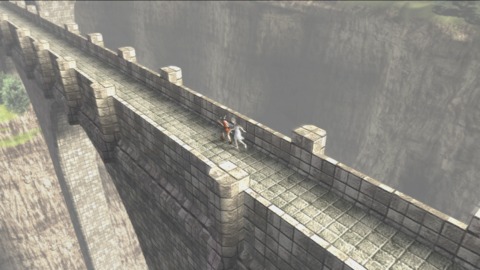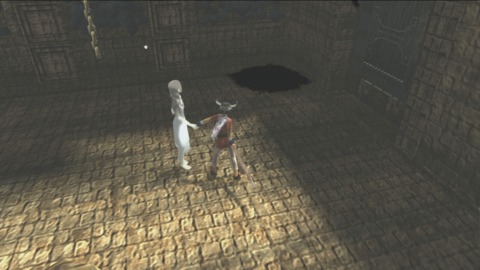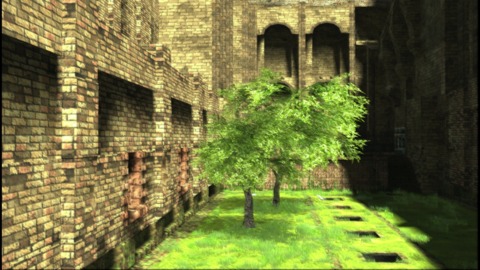Thoughts on Ico
By TheYouthfuls 13 Comments
This article contains spoilers for the entire game (and very minor spoilers of Brothers: A Tale of Two Sons). If you haven't I suggest you go and play Ico before coming back to read the rest.
So last week on my show ‘BEN BEATS GAME’ (in which I beat at least one game each week), I set myself the goal of finally getting around to completing Ico and Shadow of the Colossus on their PS3 HD collection. I played them all the way through in the same week, finally experiencing these supposed classics and judging them fairly, including any and all flaws I may have found. However, despite any of the criticisms I might throw at the either game from time to time, they all pale in comparison to how incredible every other aspect is.
Let’s start with Ico. It’s one of the most focused games I’ve ever played; it’s about minimalism, it’s about environmental puzzles, it’s about a boy and a girl holding hands. That final point presents an adorable and effective mechanic that I see as the game’s greatest accomplishment.

Reminiscent of last year’s Brothers: A Tale of Two Sons, the relationship between Ico and Yorda is built primarily through the gameplay mechanics. Such an intimate relationship between the two of them, as well as the player, is something only possible in games. For example, a book can stress how close two characters are, their reliance on one another and a movie can depict this in various ways. This means that when they are separated you know it’s a terrible thing, you can feel sympathetic towards them. What you can’t do is truly feel like you yourself are missing something. That’s where games like Ico and Brothers come in; Brothers creates a huge impact when you are unable to control one of the brothers at a point. During Ico it becomes routine to go back and get Yorda, meaning near the end when you progress without her by your side there’s not only a character being missed, but also a core mechanic, an actual bond between the player and the character that can only be developed through gameplay. By utilising this, Ico has stuck with me just like Brothers simply due to a mostly ambiguous relationship between a boy and a girl.
Graphically Ico holds up thanks to the unique design and architecture. The setting of a prison is intelligent in that it means the developers were able to get some stunning environments out of a relatively small amount of fairly impressive textures, with the prison setting being an excuse to have these repeating textures considering conventions of a prison imply repetition of the same bricks and design. Instead of many minor details, Ico goes for grand scales with lengthy stone bridges and magnificent doors filled with interesting symbols. However, when zoomed out, as most of it is, the repeating textures are much more noticeable and can take away from the experience. The game looks good because of the pleasant aesthetics, but the design is still based enough in realism that I believe it would benefit from a full remake to improve these shortcomings in textures and anti-aliasing (or lack thereof).
The puzzles in the game are well thought out and executed with only a few things holding some of them back. One of the problems is that while I love the cinematic camera that moves on its own to give a distinct presentation and feel to the game making most screenshots look gorgeous, it creates a problem for some puzzles; they are reliant on your surroundings and you aren’t able to rotate the camera around Ico, leading to some confusion of where things are exactly, but mainly making it difficult to get an easy sense of your current location. Due to some camera angles only showing you the corner of an area, you generally have to spend some time going over the same area just to make sure you know what you’re doing. To get around this, many (including myself) will likely just interact with as many things as possible and eventually see how they fit together. It’s likely that this feeling was intentional, but doing stuff like pushing a box down to another level without knowing exactly why I was doing it made me think more about why the designers put it there and that they wouldn’t let me do this because it would mean I’d be stuck. Unfortunately this took me out of the experience a few times as I saw the environmental design as something constructed by designers (as they are) rather than a real place that could exist. It’s not necessarily an outright bad thing and the feeling of seeing my random decisions come together can be satisfying, it just makes me feel as if I’m going through the motions quicker than other forms of design; get to a new area. Find things to interact with. Interact with all of the possible things. Either the puzzle is solved or I see how to solve it. It’s a more personal sentiment, but I feel that looking at everything, imagining how it all comes together, then trying that out is a better experience. But a restricted camera made doing this inefficient, despite loving it from an aesthetic design point.

Something that Ico has which is absent from Brothers is recurring combat, and it shows as time goes on to be the worst part of the game by far. I’d say Ico is primarily a puzzle platformer that focuses on utilising the environment. Then there’s this combat thrown in, which while it fits with the story, it doesn’t feel satisfying and especially when many shadows are thrown at you it becomes extremely repetitive. The goal of these shadows is to capture Yorda and the fact that the player can’t die means that you’re only worried about her, thus building the relationship and the idea that you need each other. The player requires Yorda to progress through certain doors, and to stand on switches, but Yorda needs to be protected from these shadows. Pulling her back from the shadow pit she gets dragged into is the best part of this combat section, adding the most tension and physicality to the situation. Other than that the combat makes sense considering you’re just a boy with a stick, but doesn’t quite excuse how awful it is. However, you can run past the shadows in various situations which I believe adds to the tension; if you fail to run past effectively your punishment is experiencing some boring combat!
Towards the end of the game, combat takes on new meaning with the subtle reveal of shadows with horns. There isn’t a close-up of them, no zoom-in to show you that these horns are there with some significance, nor any dialogue from them or anyone explaining the story, it’s left up to the player much like the rest of the game. Because the prison is for children cursed with horns, we are left with the assumption that these shadows (at least at the end) are in fact the souls of these likely dead children, or something of the sort.
As previously mentioned, Ico has a large focus on minimalistic design. This is very apparent in the music which is either non-existent or subtle, even in the combat scenarios. This changes for the fight with the horned shadows, instead of the typical track, a more depressing one starts to play which represents the depressing situation of both Yorda (she has been turned to stone) and these shadows. Then there’s the final boss music which filled me with just as much despair as the track before. Essentially all of the music in Ico is fantastic; it’s subtle when it needs to be, and more overt when there’s a real point to it. I absolutely adore this use of music. The main theme: ‘You Were There’, is the only piece featuring (beautiful) lyrics, making it all the more powerful when heard at the very end. I wish it wasn’t used in the HD Collection menu so that the end was the first time I had heard it, making it even more effective of a song.

Yorda carrying Ico out to the boat when he is unconscious is the first time we see her take the more prominent role of a carer, as Ico has been throughout the rest of the game. While they may have been relying on each other, it’s clear that the player is the one doing most of the work, which makes sense from both a narrative and gameplay standpoint; Yorda appears to be fragile and it’s obvious that the player character should do more work so that a complete experience can be had. But at this final moment Yorda returns the favour by saving Ico and parting ways. Thanks to this finale, we are given a satisfying end to their relationship in a cutscene that justifies its existence because of the fact that we never control Yorda and our character is incapable of being controlled at this moment. I have to commend Ico for its sparse use of cutscenes; they are only used for truly huge events within the world and story that likely can’t be achieved without the developers having control over everything. This was such a sad ending before the post-credits sequence. I was saddened because Ico had risked so much just to go back and get Yorda, but instead ended up with two broken horns and no Yorda. This is the second part where I felt affected emotionally by their relationship and events impacting it, the first being the initial separation. The final part was in the post-credits sequence which could have easily been another cutscene, but to engage the player, the developers give you control over Ico wandering the beach, eventually coming across Yorda washed up. This moment overwhelmed me with a great deal of happiness at their reunion; Ico’s goal had been accomplished and Yorda had been returned to her normal state. While I would have been fine with the first ending, the very final sequence was so effective at driving home the relationship built between the characters and how much it meant to me that I can’t imagine the game being quite as complete without it
So overall my thoughts on Ico are incredibly positive, and despite beating it in a single 7 hour sitting I didn’t become too fatigued at any point; a testament to how these mechanics and story intertwine to create an experience that is a joy to play from start to finish. One that I would recommend to anyone who appreciates subtlety, slow pacing and ambiguity.
- Ben Lucas (@TheYouthfuls)
P.S. Those interested in some thoughts in video format can go here: https://www.youtube.com/watch?v=erERUNFyZn8
